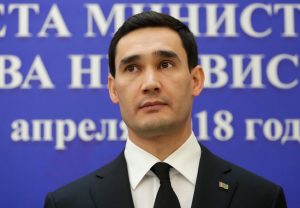Turkmenistan’s autocratic president has named his only son to head the country’s newly established ministry for construction and industry.
The appointment, announced this past Saturday in the government’s newspaper Neitralny Turkmenistan, comes just days after President Gurbanguly Berdymukhamedov allocated $1.5 billion for the construction of a new city in the province that was governed by his son Serdar.
Serdar Berdymukhamedov is widely viewed as being groomed to succeed his father, who has established a pervasive cult of personality since becoming Turkmenistan’s leader in 2006 after the death of Saparmurat Niyazov. By moving from the regional governorship to the ministerial post, Serdar is likely to gain prominence as the head of costly and visible projects.
Last week the Turkmen government finally put a public price tag on a previously reported endeavor to build a new administrative center for Ahal province. President Berdymukhamedov said in a decree that $1.5 billion would be allocated for “foreign-made equipment and materials needed for construction” of the as-yet unnamed city.
Serdar has held a number of government posts in the past few years. In 2016, he gained a seat in Turkmenistan’s parliament in snap elections. Serdar led the foreign ministry’s information department before becoming the chairman of the parliament’s legal affairs committee in March 2017. He was then appointed deputy foreign minister in March 2018. Less than a year later, in January 2019, a presidential decree announced that Serdar would be leaving his post to become deputy governor of Ahal province. In June 2019, he was promoted to governor of the province.
Given Serdar’s trajectory, it’s hard not to believe he’s heading for the presidency once day.
No Turkmen election has been judged free and fair by any meaningful measure. The OSCE sent an observation mission comprised of just six core experts to the 2018 parliament election. For comparison, the OSCE had 11 “core team experts,” 30 long-term observers, and 250 short-term observers to cover the latest Uzbek parliamentary election. In its final report after the 2018 Turkmen parliamentary election (in which Serdar retained his seat with an apparent 90 percent vote), the OSCE stated that the “elections lacked important prerequisites of a genuinely democratic electoral process.” The report also noted that Serdar received media coverage, but “no similar coverage was provided to other candidates.”
Turkmenistan isn’t scheduled to hold presidential elections until 2024. By then, the elder Berdymukhamedov will be 66 and his son 42.
The matter of political transition is a perennial hot topic in Central Asia. Such transitions rarely go according to the plans laid out in regional constitutions and are seldom decided by voters, even when there are elections. This adds a degree of not just uncertainty but intrigue to the process. Turkmenistan’s overarching opacity amplifies that intrigue factor.
There have been several models put in play across the region for power transitions. Kyrgyzstan has transitioned leaders via revolution twice, and election once (or twice, if we count Atambayev’s election following Rosa Otunbayeva’s interim presidency). Kazakhstan has (sort of) transitioned leadership via resignation and then election, but First President Nursultan Nazarbayev remains powerful and President Kassym-Jomart Tokayev’s snap election gave very little time for any other candidates to even attempt to compete.
In both Uzbekistan and Turkmenistan, the transition between presidents was triggered by a death in office and both side-stepped constitution-designated lines of succession.
When Niyazov, Turkmenistan’s first president, died in 2006, Berdymukhamedov was deputy chairman of the Cabinet of Ministers, a post essentially the same as a vice president and one he’d held since 2001. Trained as a dentist, in the 1990s he had run the Ministry of Health’s dentistry center before being promoted in 1997 to run the ministry. When Niyazov died, Öwezgeldi Ataýew, the chairman of the Assembly of Turkmenistan and constitutionally supposed to take over as acting president, was subject to criminal charges and the State Security Council of Turkmenistan appointed Berdymukhamedov as acting president.
Uzbekistan also side-stepped its constitutional process, with Nigmatilla Yuldashev, the chairman of the Senate and constitutionally second-in-line for the presidency, proposing long-time Prime Minister Shavkat Mirziyoyev to take the post instead.
At some point, Turkmenistan will go through another political transition — whether in 2024 or later. From the available evidence, it looks like Serdar is on deck. A death in office introduces uncertainties, which Berdymukhamedov may seek to evade by setting his son up for election.
With reporting by the Associated Press.
































